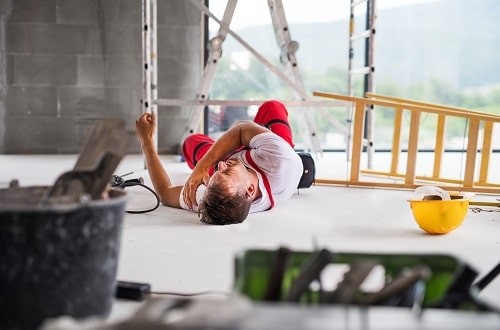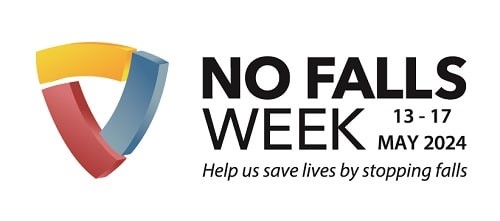Businesses that require employees to work at height are urged to take part in a new week-long campaign aimed at educating everyone at work about the terrible consequences of falls from height and how to prevent them.
Features
No Falls Week, 13–17 May: a powerful campaign to promote safe working at height
The No Falls Foundation, the charity dedicated to the work at height sector, is proud to be launching its first ever No Falls Week, a powerful campaign dedicated to promoting safe working at height. No Falls Week’s mission is simple yet crucial: to raise awareness about the importance of safe working at height. Taking place on May 13–17, 2024, No Falls Week will provide the opportunity for organisations in all sectors to focus on work at height safety.
Whether in construction, manufacturing, agriculture or any other sector, our campaign aims to equip organisations with the knowledge, tools and inspiration to prevent falls and ensure everyone that works at height comes down safely.
 Photograph: iStock/Halfpoint
Photograph: iStock/Halfpoint
Why No Falls Week matters
Falls from height are consistently the leading cause of workplace fatalities in the UK. The latest figures from the Health and Safety Executive show that 40 people lost their lives due to a fall from height in 2022/2023. Falls from height were responsible for 30 per cent of all workplace deaths. Every year thousands of non-fatal falls take place – it’s estimated to be as many as 100 every day.
Getting involved in No Falls Week
Employers can get involved in No Falls Week by organising various activities tailored to their specific industry and workforce. This may include hosting toolbox talks, workshops or safety demonstrations, distributing informational materials, and engaging in social media campaigns.
The Foundation provides a toolkit with resources and guidelines to assist organisations in planning and implementing activities during No Falls Week. By actively participating, employers not only contribute to the broader safety narrative but also demonstrate their dedication to the wellbeing of their employees.
To sign up for No Falls Week or for more information, visit https://nofallsweek.org/get-involved/
About the No Falls Foundation
The No Falls Foundation is the charity devoted exclusively to the work at height sector. The Foundation is dedicated to preventing falls from height and helping people affected by the life-changing consequences of a fall.
 Hannah Williams is charity manager at No Falls Foundation. Photograph: No Falls Foundation
Hannah Williams is charity manager at No Falls Foundation. Photograph: No Falls Foundation
The No Falls Foundation, in partnership with stakeholders such as the Access Industry Forum (AIF), other trade associations and professional bodies, as well as organisations that are committed to preventing falls from height and have signed up to the No Falls Supporter Scheme, has three distinct objectives:
Education
- Delivering a continuous programme of education highlighting the risks associated with working at height and the need for proper risk assessment, informed equipment selection and professional training
- Participating in conferences, workshops and seminars
- Raising funds, organising appeals and promoting campaigns designed to raise awareness of the life-changing injuries that can be sustained following a fall from height and objects falling from height.
Research
Research and the exchange and sharing of knowledge and information are a vital part of the Foundation’s work. The charity collaborates with a wide range of organisations with the aim of keeping people safe when working at height.
Support
The consequences of a fall from height are often life-changing and it’s not just broken bones, head injuries and punctured lungs but also mental health problems, financial worries and long-term care needs. The effects can last a lifetime.
The Foundation provides information and guidance, support and financial aid to those in need following a fall from height or injuries sustained from objects falling from height.
If you or someone you know has been affected by a fall from height, get in touch via our website to see how we can support you.
You can also download our support pack which covers a wide range of topics. These include: what to do immediately after a fall from height; what financial assistance may be available; how to begin a personal injury claim; support with transport and home adaptations; using the No Falls Befriending Service; and other organisations that can help and offer advice.
Finally, you can keep up with the latest information on No Falls Week as well as the charity’s other activities by subscribing to our newsletter. You can also spread the word about No Falls Week by sharing our resources and messages on social media using #NoFallsWeek to raise awareness among your peers and networks.
Hannah Williams is charity manager at No Falls Foundation.

For more information see:
FEATURES

How to mitigate the hearing loss cost escalation tsunami
By Peter Wilson, Industrial Noise and Vibration Centre (INVC) on 06 February 2026
Employers need to adopt the latest and most effective noise risk evaluation and management measures, or face rapidly-rising compensation claims for noise-induced hearing loss at work.

Young drivers and work-related road risk: why employers must act now
By Simon Turner, Driving for Better Business on 06 February 2026
Young drivers have a higher risk of being involved in road collisions due to factors such as their inexperience, so when employing them to drive for work, it is vital they receive the right support to help them grow into safe professionals behind the wheel.

Financial stress: why and how it affects workplace safety
By Chloe Miller, freelance writer on 06 February 2026
Financial worries can lead to cognitive impairment that increases the risk of workplace accidents, so it’s essential employers provide financial education and confidential support for workers who may be struggling with problems like debt and unexpected living expenses.



